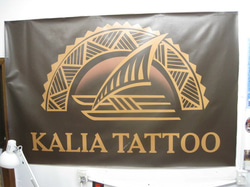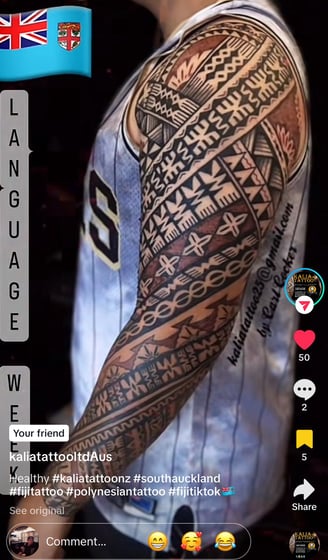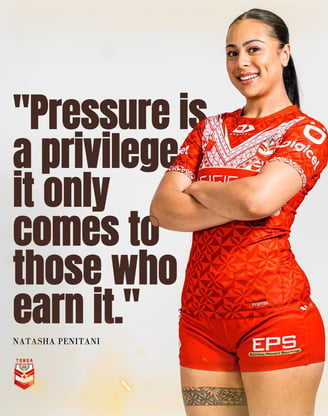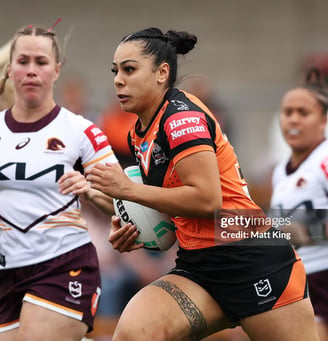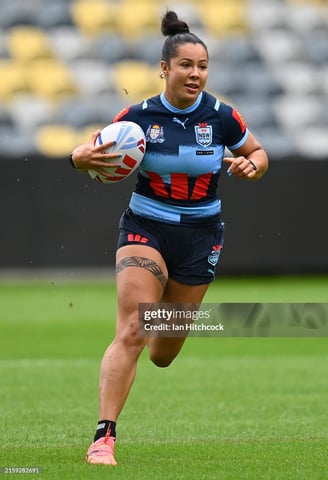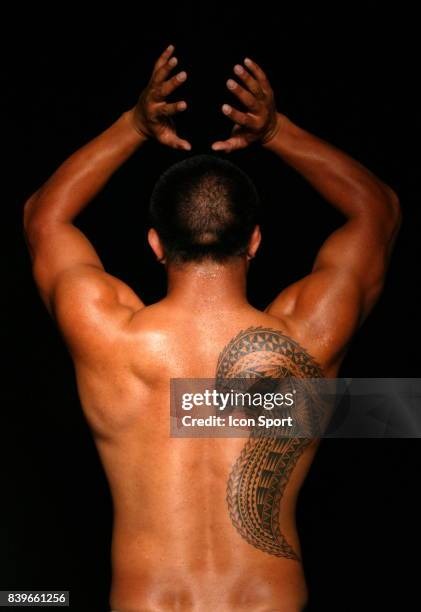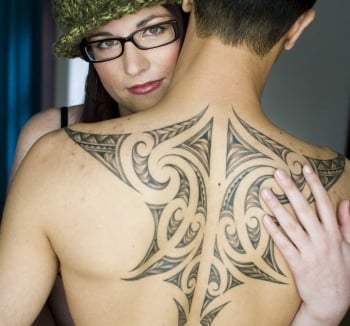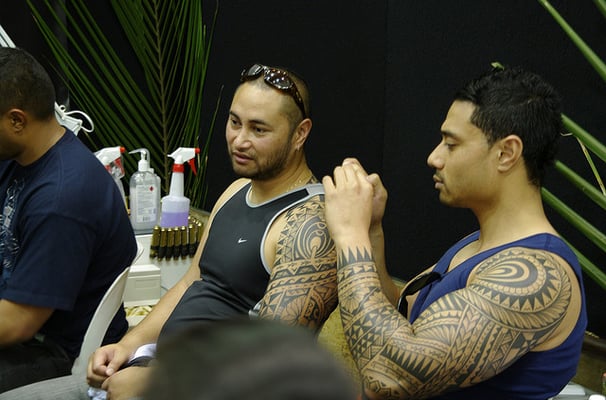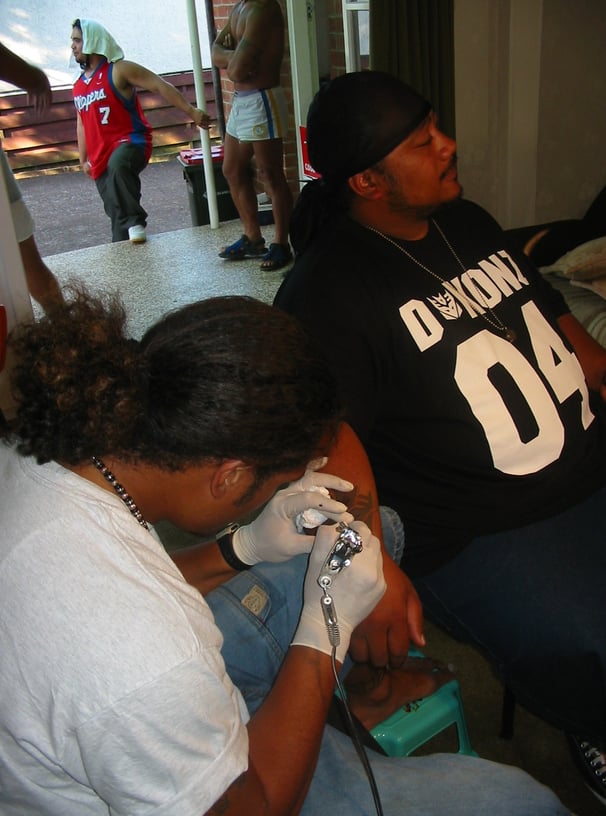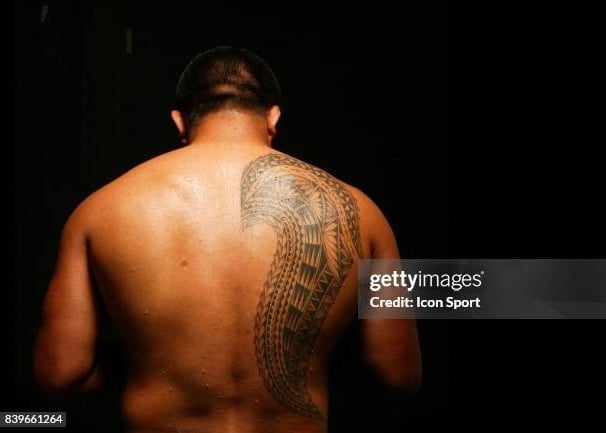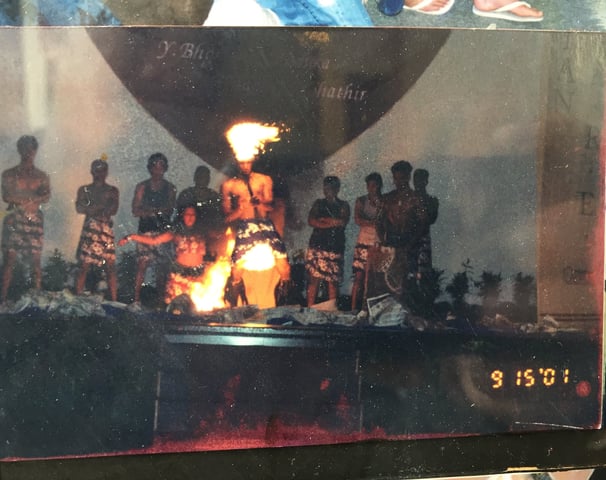Polynesian Tattoo Mastery Rooted in Culture, Crafted in Australia
Explore our Polynesian tattoo gallery featuring Tonga, Samoa, Māori, Fiji, Rotuma, Niue, Tokelau, Tuvalu, Tahiti, Cook Islands, Marquesas, Uvea mo Futuna and custom designs. Kalia Tattoo blends tradition, mentorship, and contemporary style.
波利尼西亚纹身背后的意义是什么?
폴리네시안 타투에는 어떤 의미가 있나요?
รอยสักโพลินีเซียนมีความหมายว่าอย่างไร?


3000+ Happy clients since 2001
About Kalia Tattoo – Honoring Polynesian Tattoo Heritage with Purpose
Welcome to Kalia Tattoo, where ancestral tradition meets modern craftsmanship. I’m Carl Cocker, founder and lead artist, and one of the first professional Tongan tattoo artists recognized in New Zealand and Australia. Born into a lineage that spans Tonga, Fiji, New Zealand, Malaysia, United Kingdom and the United States, I’ve spent over 20 years reviving and preserving the sacred art of Polynesian tattooing.
My work is inspired by the legacy of the ancient Tongan kalia voyagers—our navigators, warriors, and cultural visionaries. At Kalia Tattoo, I specialize in authentic Polynesian and Pacific Island tattoos, combining traditional design elements from Tonga, Samoa, Fiji, Niue, Rotuma, Tokelau, Cook Islands, Tahiti, Marquesas, Hawaii, Māori New Zealand, and beyond. Each tattoo is a custom-designed, culturally grounded artwork, transforming your skin into a living canvas of story, identity, and heritage.
🔥 What Makes Us Different
✅ Over 20 Years of Experience in Cultural Tattoo
✅ One of the First Tongan Tattoo Artists to Represent Tonga at International Tattoo Conventions
✅ Custom Polynesian Tattoo Designs Honoring Sacred Protocols and Genealogy
✅ Multi-Regional Influence: Tongan, Samoan, Fijian Masi, Maori Ta Moko, Marquesan Patutiki, Rotuman Motifs & More
✅ Offering Legacy Tattoos, Full Sleeve Tattoos, Dragon Tattoos, Tribal Tattoo, and Contemporary Design & Cultural Fusion Work
At Kalia Tattoo, our mission is to connect people to Pacific Island heritage through meaningful, ancestral body art. Whether you're looking to express your Polynesian roots, honor your family, or explore your connection to island traditions, this is your place to begin that journey.
Explore my tattoo gallery, learn about the cultural meaning behind each design, or book your private custom tattoo session. I invite you to be part of the cultural renaissance that’s preserving and elevating Pacific tattoo traditions for future generations.
Carl Cocker – Founder of Kalia Tattoo | Polynesian Tattoo Artist in Australia, New Zealand & Worldwide
Carl “Kalia” Cocker, founder of Kalia Tattoo, is one of the first professional Tongan tattoo artists to gain international recognition. Raised during the 1980s–2000s across Tonga, Fiji, New Zealand, Malaysia, and the United States, Carl’s upbringing immersed him in a rich blend of cultures from across the Pacific Islands, including Samoa, Niue, Rotuma, Tokelau, Cook Islands, Solomon Islands, Papua New Guinea, and Indo-Fijian communities. This multicultural background shaped his lifelong mission: to revive, preserve, and unify Polynesian tattoo traditions through authentic, respectful, and meaningful body art.
🌊 The Origins of a Tattoo Renaissance
After leaving an engineering program in Kuala Lumpur in 2001, Carl began his tattoo journey under challenging circumstances. Homeless but determined, he started tattooing Chinese Malaysian and Singaporean clients in a region where tattooing was still stigmatized. This marked the beginning of a career that would span decades and continents.
By 2006, Carl became a leading figure in the Polynesian tattoo renaissance, winning 1st Place at the prestigious Tahiti Tattoo Convention—the youngest artist at age 25, and the first Tongan tattoo artist to attend the event. His innovative fusion of Māori tā moko, Samoan tatau, Tongan tatatau, and Fijian masi tattoo, combined with gray wash shading, brown and white ink techniques, made his style revolutionary and respected by tattoo masters across the Pacific.
🌍 Global Legacy & Cultural Preservation
Carl was the first Tongan tattoo artist to register the domains “Tongan Tattoo” and “Kalia Tattoo” online—helping bring Tongan tattoo designs to a global audience through the internet. In 2009, he opened Kalia Tattoo, the first Tongan-owned tattoo studio in New Zealand, paving the way for other Tongan artists across New Zealand and Australia.
Throughout his journey, Carl collaborated with Marquesan tattoo legends such as Simeon and Tihoti, and worked tirelessly to revitalize lesser-known Polynesian tattoo styles from Fiji, Niue, Rotuma, Tokelau, Tuvalu, Uvea, Futuna, and the Cook Islands. His mission was not just artistic—it was cultural, spiritual, and unifying.
Carl has tattooed rugby legends, including being the first Polynesian tattoo artist to ink a Tongan tattoo on an All Blacks player, the late Sione Lauaki , followed by other iconic players in the NRL, Super Rugby, and international teams.
🔥 Kalia Tattoo: A Movement, Not Just a Studio
Carl’s vision extends beyond individual artwork. Like the ancient Tongan Kalia canoes that connected islands across the Pacific, Kalia Tattoo is a vessel of cultural connection—weaving together ancestral tattoo styles from Tonga, Samoa, Fiji, Māori New Zealand, Niue, Rotuma, and beyond.
His tattoos serve as visual stories—honoring tribal lineages while embracing a modern identity. Kalia Tattoo stands at the forefront of Polynesian tattoo revival, not as a trend, but as a deeply rooted tradition carried with pride, purpose, and unity.
Keven Mealamu Luke McAlister Jerome Kaino ‘Ofa Tuungafasi
His clients also include NRL great Taniela Tuiaki , Fuifui Moimoi , Australian-Tongan professional rugby league sisters Natasha Penitani and Tiana Penitani who plays for Tonga Women Rugby League and Australian Women Jilaroos rugby league national team.
WWE Hall of Fame wrestlers American Samoan Umaga and Rikishi
New Zealand hip-hop legends SAVAGE , DEVOLO , and MAREKO of Deceptikonz of the iconic Dawn Raid Entertainment.
Even UB40 lead singer Ali Campbell , in 2005, sought Carl Kalia talent in a private session, avoiding the attention of fans and trusting Carl to capture his vision in the comfort of a garage studio.
Carl’s commitment to unity also extends to his embrace of Indo-Fijian culture. Recognizing the economic and cultural contributions of Indo-Fijians to Pacific Island society, Carl proudly tattooed many Indo-Fijians in New Zealand, despite backlash from those who did not see them as part of the Polynesian community.
For Carl KALia, art has always been about inclusion, about honoring every facet of Pacific Islander identity.
In 2013, he and his family survived a near-fatal fishing accident, swimming for two hours in the cold New Zealand ocean before being rescued.
In 2017, a fire destroyed his home, but the Polynesian community—and even non-Polynesians—rallied around him, donating funds to help him rebuild.
These experiences only deepened his commitment to using his art as a force for healing and unity.
He designed a custom Polynesian tattoo art for a New Zealand GT race car and created a limited-edition cologne inspired by Polynesian art patterns.
💪 Health, Strength & Cultural Empowerment: The Story Behind Team Dymond
In addition to his legacy in Polynesian tattooing, Carl Cocker is also the founder of Team Dymond, a fitness and bodybuilding brand created in honor of his late son. For over a decade, Team Dymond has inspired Pacific Islanders in New Zealand, Tonga, and Australia to pursue healthier lifestyles through bodybuilding, fitness coaching, and nutrition education. Carl has worked closely with Tongan and Samoan communities to address rising health issues like diabetes, obesity, and heart disease—conditions that disproportionately affect Pacific Island families.
Through Team Dymond, Carl shares a message of strength, discipline, and mental resilience, helping community members transform their health while reclaiming their cultural pride. His fitness movement reflects the same philosophy as his tattoo work—honoring the body as a sacred vessel for ancestral identity, strength, and self-expression.
⚠️ Resilience Under Pressure: A Life of Courage and Diplomacy
Carl’s journey hasn’t been without danger. While building his reputation in Australia, Carl faced threats from armed motorcycle gang members, but through his calm, diplomatic presence, he was able to de-escalate the situation peacefully. His past also includes working in Malaysia, where he tattooed Chinese gang members and navigated dangerous environments with the same clarity and focus he brings to his craft.
Throughout his travels in New Zealand, Australia, and the U.S., Carl witnessed firsthand the racial and territorial divides among Polynesian tribes—including rivalries between Tongans, Samoans, and Māori communities. Rather than fueling these divisions, Carl dedicated his art to building bridges, not barriers.
🎨 Kalia Tattoo: A Cultural Studio, Not a Tattoo Shop
Carl’s studio, Kalia Tattoo, is more than a tattoo space—it is a cultural sanctuary. It serves as a creative hub where Pacific art, history, and identity merge. Here, ancestral Polynesian designs from Tonga, Samoa, Fiji, Rotuma, Niue, Tokelau, Cook Islands, and Aotearoa are brought to life with precision, reverence, and innovation.
Each tattoo tells a story—a symbol of family lineage, personal strength, migration, survival, and unity. At Kalia Tattoo, clients don’t just receive ink—they inherit legacy.
🌺 A Beacon of Unity for the Pacific Islands
Carl “KALia” Cocker’s deep understanding of Pacific Island cultures—especially Tongan, Fijian, Samoan, Rotuman, and Polynesian diasporas—has made him a powerful voice for cultural revival and unity. His mission is to connect past and present, guiding a new generation of Pacific Islanders to embrace their roots while evolving their future.
Through tattoo art, health advocacy, and cultural education, Carl continues to be a beacon of hope for Pacific Island communities around the world.
🎥 Carl Cocker: Den Första Tonganska Tatueraren – Tagata Pasifika Dokumentär (2002)
📝 Beskrivning:
Återupplev en historisk stund med denna sällsynta dokumentär från Tagata Pasifika (2002), där den då 21-årige Carl Cocker lyfts fram som den yngsta polynesiska tatueraren. Vid den tiden dominerades tatueringsvärlden av samoanska, maoriska, tahitiska och hawaiianska mästare – men Carl blev den första erkända tonganska tatueraren i Nya Zeeland. https://youtu.be/KQRyUtx9cy8?si=ouTCIU4EjAXCZab_
År 2006 representerade Carl Tonga på den prestigefyllda Tatueringsmässan i Tahiti, organiserad av den tahitiska regeringen, och vann förstaplatsen, direkt efter den japanska mästaren Shige. Videon sändes på nytt av Coconet TV år 2015 och dokumenterar början på Carls 20+ år långa resa inom tongansk tatuering och polynesisk konst.
👉 För press, intervjuer eller dokumentärsamarbete, vänligen kontakta oss: kaliatattoo25@gmail.com
Location Info
Kalia Tattoo is a private studio for Polynesian tattoo artistry in Brisbane, Queensland, Australia.
Appointments are by booking only, and the exact address will be provided upon receipt of your deposit.
Monday - Friday 09:00AM - 06:00PM
Saturday - Sunday 10:00am - 7:00PM
